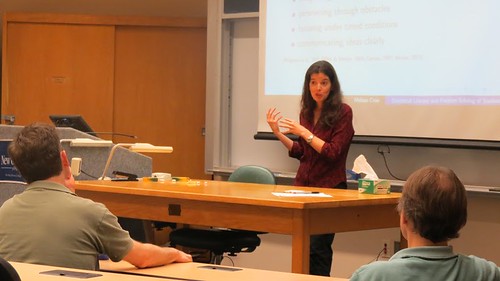
During Sam Savin’s time as provost almost ten years ago, a new institution was created at the college: the Natural Sciences Seminars. Still continuing today, the weekly seminars, open to students, faculty, and staff alike, invite professionals in a variety of science, technology, engineering, and math (STEM) fields to speak about their research.
“It was an attempt to support the scholarship of faculty members,” Professor of Mathematics and the seminars’ organizer, Patrick McDonald, said. To choose speakers, the Division of Natural Sciences receives a notification at the beginning of the year asking faculty to send in the names of candidates they would like to invite. The seminars are supported by the Provost, the Foundation and the Division of Natural Sciences.
“Everybody who comes is supposed to get the same message, and the message is that the talk is supposed to be for a general audience,” McDonald explained, relaying that there is no need to be an expert on the seminars’ subjects to understand what is being said. “The talks are announced and there’s an abstract which gives you some ideas for background stuff. Any technical terms that are discussed are supposed to be explained.”
While many of the talks this year have focused on data science, reflecting the Master’s program coming next term, McDonald encourages faculty to invite people from a wide variety of scientific disciplines. “It’s huge breadth of topics covered,” McDonald said. “I’m always open to learning new things, so I like different talks for different reasons. Learning about something new in biology, for example, where I have a relative knowledge deficit, is really interesting to me for reasons that are different from learning something about math.”
Last Friday, Melissa Crow from University of Florida’s (UF) Department of Statistics spoke about her work on instructional strategies with learning disabled students. Connected to McDonald through her advisor at UF, Crow was attracted by the data science program and decided to give a job talk, which is part of the graduate school process.
“The whole idea of data science is kind of this critical inquiry mindset where you want to be able to take in data and have this critical response to it, thinking about it, figuring out if it makes sense, is it good data, how am I going to summarize it, and that’s really the heart of liberal arts as well. It’s not just about memorizing facts, it’s about how you approach the world,” Crow said, speaking about the new data science Master’s. “I think it’s a really good fit for New College. I’m excited to see how it turns out.”
Crow received an undergraduate degree in math and sociology from Emory University and a Master’s in statistics from UF. Close to receiving her doctorate in statistics from UF, Crow first appreciated the discipline when she realized it was a nice combination of mathematical concepts and human connections. “Statistics really seemed to bridge the gap,” Crow explained. “It’s mathematically based, but it’s all about people and the world around us, making conclusions about the world around us using data.”
“People use statistics to lie all the time,” Crow said. “My response to that is, ‘Yeah, but people lie without statistics all the time too!’ The more you know about statistics, the more you can catch people when they’re lying to you.”
Crow appreciates the power that data can grant an individual. “When you have the confidence in your data, it gives you the ability to stand up to other people on an equal footing,” Crow said. “If you let other people hold all the data, then you’re at a distinct disadvantage.”
“That’s the power of data. Spend ten minutes online and make a spreadsheet and suddenly you have the power in the relationship instead of them setting all the terms, and I think that’s true in everybody’s life,” Crow continued. “It doesn’t matter what your job is going to be, we live in a world where there’s a lot of data, and you need to feel comfortable with that. So that’s one reason I’m so passionate about statistics education as well as doing statistics.”
There has been an incredible growth in statistics courses in the past few years. In 1997, only 7,500 high school students were taking Advanced Placement Statistics. Now, that number has reached 200,000 students. However, simultaneously, there is also a rise in the amount of students with registered learning disabilities. This broad group includes students who have trouble reading, writing, listening and spelling. Crow analyzed what obstacles these students face in statistics courses compared to students without registered learning disabilities. The overall goal of her research is to create a universal curriculum that will benefit all students. Her explorative work found that learning disabled students struggle with foundational ideas, such as symbols, language and concepts; consistency; organization; and using the actual testing documents. A surprising result was that almost all students, those with and without learning disabilities, did not like to use their textbooks for looking up information. Many did not even know how to do so, an interesting conclusion that got a lot of the faculty in the audience discussing.
Natural Sciences Seminars are held on a regular basis at 4 p.m. in Heiser’s Chae Auditorium. “They are always announced, they are always posted both physically around the building, they are always kind of mailed to faculty, students and staff,” McDonald said.
